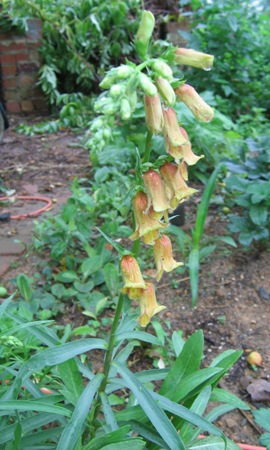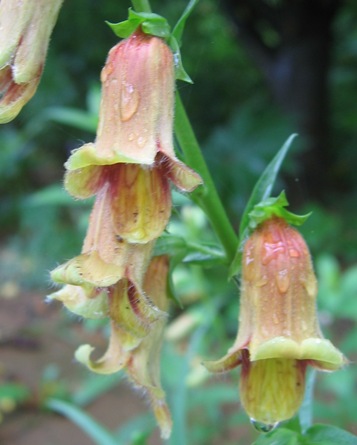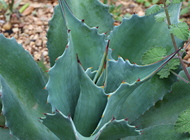 |
Digitalis obscura |
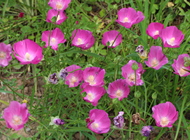 |
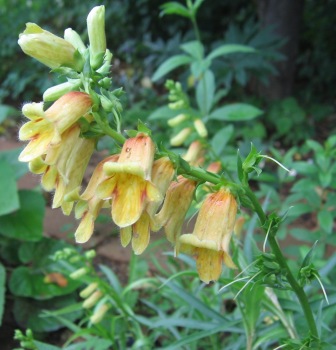
| | Dynamic coloration - after a few days, colors are lighter |
| Common name |
willow-leaf foxglove |
| Family |
scrophulariaceae |
| Life cycle |
biennial/perennial (Z6-10) |
| Flowers |
red-orange |
| Size |
1-3' |
| Light |
sun-part shade |
| Cultural notes |
well-drained soil |
From seed  |
germinate at room temperature with exposure to light
detailed seed-starting info below
|
In the early spring garden, these plants (started from seed last year) were truly the ugly ducklings. They had made a half-hearted attempt to remain evergreen, but by spring the scraggly leaves were turning brown, some falling off, leaving a sad upright stalk with some dismal leaves attached. Needless to say, they didn't sell very well in my plant sale. Somehow, that only increases their charm when they come into their own in late spring - with flowers in colors and patterns that are more dramatic than those of most other perennial foxgloves. That last statement is an optimistic one, of course - I've yet to see if these act like biennials or claim a more permanent place in the garden.
|
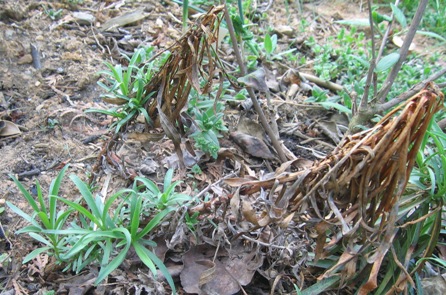
| | Example of the scraggly appearance as new growth starts. Now that I've taken the photo, I'll prune the old growth away... |
|
We're re-establishing this plant this year (it used to grow in our garden, but slipped away) Follow along as I stroll past all the Digitalis species that have called our garden home One or more images of this plant are included in my stock photo catalog About my plant portraits
PlantLinks to other web pages about Digitalis obscura
Some particularly helpful links to other websites
- Seed from '04 trade. Baggy 70F with light (60%G, 9-15d). Not all germinated seeds develop, seem to resent baggy treatment.
- Seed from NARGS '11/'12 exchange. Baggy 70F with light (no G, 3w)
- Same seed as above. Baggy 70F with light (29%G, 13-19d). Interesting how these showed fair germination, compared to none at all last year.
- Same seed as above. Baggy 70F with light (33%G, 17-30d). Many of the sprouted seeds did not survive after potting up.
- Seed from NARGS '23/'24 exchange. Baggy 70F (50%G, 5-11d). Seedlings deteriorated quickly in baggy; low survival rate even after early transplant
- Same seed as above. Baggy 70F (58%G, 7-16d)
- Same seed as above. Baggy 70F (65%G, 6-8d)
Pot-sowing or direct-sowing may be better for these
I welcome comments about my web pages; feel free to use the form below to
leave feedback about this particular page. For the benefit of other visitors
to these pages, I will list any relevant comments you leave, and if
appropriate, I will update my page to correct mis-information. Faced with an
ever-increasing onslaught of spam, I'm forced to discard any comments including
html markups. Please submit your comment as plain text. If you have a
comment about the website as a whole, please leave it in my
guestbook. If you
have a question that needs a personal response, please
e-mail me.
Last modified:
January 24, 2026
Contact me
|


